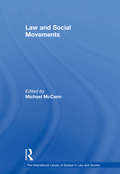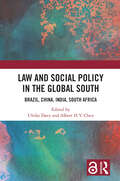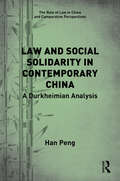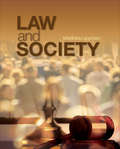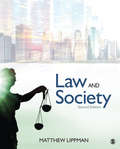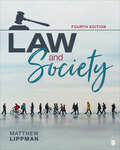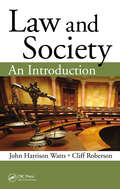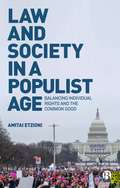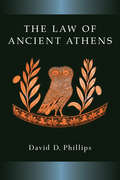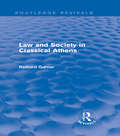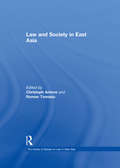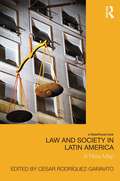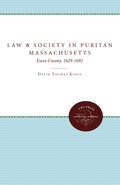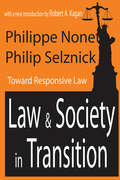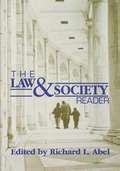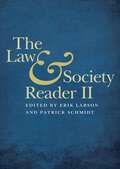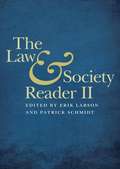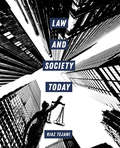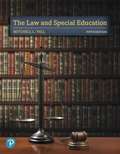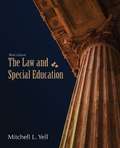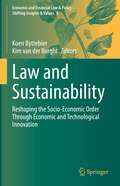- Table View
- List View
Law and Social Movements (The\international Library Of Essays In Law And Society Ser.)
by Michael McCannThe work of both socio-legal scholars and specialists working in social movements research continues to contribute to our understanding of how law relates to and informs the politics of social movements. In the 1990s, an important line of new research, most of it initiated by those working in the law and society tradition, began to bridge the gaps between these two areas of scholarship. This work includes new approaches to grouplegal mobilization politics; analysis of the judicial impact on social reform struggles; studies of individual legal mobilization in civil disputing and an almost entirely new area of research incause lawyering. It brings together the best of this research introduced by a detailed essay by the editor.
Law and Social Policy in the Global South: Brazil, China, India, South Africa
by Ulrike Davy Albert H.Y. ChenThe book is an in-depth study of the origins and the trajectories of the law governing social policies in Brazil, China, India, and South Africa, four middle-income countries in the global South with a history in social policy making that starts in the 1920s. The policies of these countries affect almost half of the world’s population. The book takes the legal framework of the policies as a starting point, but the main interest lies behind the letter of the law: What were the objectives and goals of social policy over the course of the last 100 years? What were the ideas, ideologies, and values pursued by relevant actors? The book comprises four country studies and a comparative study. The country studies concentrate on the political and social context of social policy making in Brazil, China, India, and South Africa as well as on the ideas, ideologies, and values underpinning the constitution, statutory laws, and case law that frame and shape social policy at the national level. The country studies are complemented by a comparative study exploring and describing the commonalities and differences in the ideational approaches to social policies across the four countries, nationally and – in the formative decades – internationally. The comparative study also identifies the characteristics that make Brazilian, Chinese, Indian, and South African social policies distinct from European social policies. With its emphasis on law and drawing on legal scholarship, the book adds a new dimension to the existing accounts on welfare state building, which, so far, are dominated by European narratives and by scholars with a background in sociology, political science, and development studies. This book is relevant to specialists and peers and will be invaluable to those individuals interested in the fields of comparative and international social security law, human rights law, comparative constitutional law, constitutional history, law and development studies, comparative social policies, global social policies, social work, and welfare state theory.
Law and Social Solidarity in Contemporary China: A Durkheimian Analysis (The Rule of Law in China and Comparative Perspectives)
by Han PengThis book adopts Durkheim’s legal perspective to treat law as a symbol of social solidarities to examine Chinese society. The work analyzes changes in the nature of social solidarity from observing changes in laws, thus drawing together western socio-legal theory and distinctive Chinese conditions. It draws on Durkheim’s theoretical framework and methodology to develop a more comprehensive understanding of the role of law using theories of others such as Habermas and by taking into account the discussion of power and the conflicts of interests in analyzing key social features during transition. The analysis of social anomie in terms of the changes of juridical rules as well as the changes in the nature of social solidarity provides an inspiring perspective to look into contemporary social problems. The book will be essential reading for researchers and academics working in the areas of socio-legal studies, legal theory and law and society in China.
Law and Society
by Matthew LippmanLaw and Society offers a contemporary yet concise description of the structure and function of legal institutions, along with a lively discussion of both criminal and civil law, as well as basic legal doctrine. Unlike comparable books on law and society available today, Matthew Lippman takes an interdisciplinary approach to integrate distinctive coverage of diversity, inequality, and globalism through an organized theme in a strong narrative. This practical and invigorating text provides readers with a better understanding of the connection between law and society and the impact recent literature on crime, justice, international human rights, and law has had to promote that connection.
Law and Society
by Matthew Lippman“This is a well-rounded book that seems more interesting to students than other books I have used. It provides information on some cutting-edge themes in law and society while staying well grounded in the theories used by law and society practitioners.” —Lydia Brashear Tiede, Associate Professor, University of Houston Law and Society, Second Edition, offers a contemporary, concise overview of the structure and function of legal institutions, along with a lively discussion of both criminal and civil law and their impact on society. Unlike other books on law and society, Matthew Lippman takes an interdisciplinary approach that highlights the relevance of the law throughout our society. Distinctive coverage of diversity, inequality, civil liberties, and globalism is intertwined through an organized theme in a strong narrative. The highly anticipated Second Edition of this practical and invigorating text introduces students to both the influence of law on society and the influence of society on the law. Discussions of the pressing issues facing today’s society include key topics such as the law and inequality, international human rights, privacy and surveillance, and law and social control. Log in at study.sagepub.com/lippmanls2e for additional teaching and learning tools.
Law and Society
by Matthew Lippman“This is a well-rounded book that seems more interesting to students than other books I have used. It provides information on some cutting-edge themes in law and society while staying well grounded in the theories used by law and society practitioners.” —Lydia Brashear Tiede, Associate Professor, University of Houston Law and Society, Second Edition, offers a contemporary, concise overview of the structure and function of legal institutions, along with a lively discussion of both criminal and civil law and their impact on society. Unlike other books on law and society, Matthew Lippman takes an interdisciplinary approach that highlights the relevance of the law throughout our society. Distinctive coverage of diversity, inequality, civil liberties, and globalism is intertwined through an organized theme in a strong narrative. The highly anticipated Second Edition of this practical and invigorating text introduces students to both the influence of law on society and the influence of society on the law. Discussions of the pressing issues facing today’s society include key topics such as the law and inequality, international human rights, privacy and surveillance, and law and social control. Log in at study.sagepub.com/lippmanls2e for additional teaching and learning tools.
Law and Society
by Matthew LippmanLaw and Society, Fourth Edition, offers a contemporary overview of the structure and function of legal institutions, along with a lively discussion of both criminal and civil law and their impact on society. Unlike other books on law and society, Matthew Lippman takes an interdisciplinary approach that highlights the relevance of the law throughout our society. Distinctive coverage of diversity, inequality, civil liberties, and globalism is intertwined through an organized theme in a strong narrative. The highly anticipated Fourth Edition of this practical and invigorating text introduces students to both the influence of law on society and the influence of society on the law. Discussions of the pressing issues facing today′s society include key topics such as the law and inequality, international human rights, privacy and surveillance, and law and social control.
Law and Society
by Matthew LippmanLaw and Society, Fourth Edition, offers a contemporary overview of the structure and function of legal institutions, along with a lively discussion of both criminal and civil law and their impact on society. Unlike other books on law and society, Matthew Lippman takes an interdisciplinary approach that highlights the relevance of the law throughout our society. Distinctive coverage of diversity, inequality, civil liberties, and globalism is intertwined through an organized theme in a strong narrative. The highly anticipated Fourth Edition of this practical and invigorating text introduces students to both the influence of law on society and the influence of society on the law. Discussions of the pressing issues facing today′s society include key topics such as the law and inequality, international human rights, privacy and surveillance, and law and social control.
Law and Society: An Introduction
by Cliff Roberson John Harrison WattsIn recent years, legal studies courses have increased the focus on contemporary social issues as part of the curriculum. Law and Society: An Introduction discusses the interface between these two institutions and encourages students in the development of new insights on the topic. The book begins by introducing definitions, classifications, and the
Law and Society in a Populist Age: Balancing Individual Rights and the Common Good
by Amitai EtzioniThe law-based, political institutions in many democratic societies are being challenged by fast-growing populist movements, parties, and leaders. In other nations, the state is failing. These seismic changes call for greater attention to be paid to the role society plays in forming and challenging laws—and how the law copes with these challenges. Amitai Etzioni, one of the most respected thinkers in the US, argues for a new liberal communitarian approach as an effective response to populism. This recognizes that different members of the society have differing values, interests, and needs that cannot be fully reconciled to legislation in a populist age. The book considers the core challenge in a variety of contexts, including national security versus privacy, private sector responsibility, freedom of the press, campaign finance reform, regulatory law and the legal status of terrorists. Thus the book offers a timely discussion of key issues for contemporary society and the relationship of the law to the citizen in a fast-changing environment.
Law And Society In The Ancient World: Law Of Ancient Athens
by David PhillipsThe Law of Ancient Athens contains the principal literary and epigraphical sources, in English, for Athenian law in the Archaic and Classical periods, from the first known historical trial (late seventh century) to the fall of the democracy in 322 BCE. This accessible and important volume is designed for teachers, students, and general readers interested in the ancient Greek world, the history of law, and the history of democracy, an Athenian invention during this period. Offering a comprehensive treatment of Athenian law, it assumes no prior knowledge of the subject and is organized in user-friendly fashion, progressing from the person to the family to property and obligations to the gods and to the state. David D. Phillips has translated all sources into English, and he has added significant introductory and explanatory material. Topics covered in the book include homicide and wounding; theft; marriage, children, and inheritance; citizenship; contracts and commerce; impiety; treason and other offenses against the state; and sexual offenses including rape and prostitution. The volume’s unique feature is its presentation of the actual primary sources for Athenian laws, with many key or disputed terms rendered in transliterated Greek. The translated sources, together with the topical introductions, notes, and references, will facilitate both research in the field and the teaching of increasingly popular courses on Athenian law and law in the ancient world.
Law and Society in Classical Athens (Routledge Revivals)
by Richard GarnerLaw and Society in Classical Athens, first published in 1987, traces the development of legal thought and its relation to Athenian values. Previously Athens’ courts have been regarded as chaotic, isolated from the rest of society and even bizarre. The importance of rhetoric and the mischief made by Aristophanes have devalued the legal process in the eyes of modern scholars, whilst the analysis of legal codes and practice has seemed dauntingly complex. Professor Garner aims to situate the Athenian legal system within the general context of abstract thought on justice and of the democratic politics of the fifth century. His work is a valuable source of information on all aspects of Athenian law and its relation to culture.
Law and Society in East Asia (Law In East Asia Ser.)
by Christoph AntonsThe massive and complex process of change in East Asia over recent decades has brought about a transformation in the nature of law and legal institutions in the region. Whilst the process of change has to some degree mimicked western models of law and legal change, there have been significant differences in approach due to the different social foundations of East Asian societies. The more obvious of these has been the variety of ways in which rule of law ideas have been adopted in many East Asian countries where the role of the state is more dominant when compared with Western models. This volume brings together a selection of the most important writings on East Asia of researchers in recent years, and shows the broad range of questions which researchers have been addressing about the effect of law reform and legal change in societies dominated by traditional values and political forces, and at a time of massive economic change.
Law and Society in Latin America: A New Map (Law, Development and Globalization)
by Cesar Rodriguez GaravitoOver the past two decades, legal thought and practice in Latin America have changed dramatically: new constitutions or constitutional reforms have consolidated democratic rule, fundamental innovations have been introduced in state institutions, social movements have turned to law to advance their causes, and processes of globalization have had profound effects on legal norms and practices. Law and Society in Latin America: A New Map offers the first systematic assessment by leading Latin American socio-legal scholars of the momentous transformations in the region. Through an interdisciplinary and comparative lens, contributors analyze the central advances and dilemmas of contemporary Latin American law. Among them are pioneering jurisprudence and legal mobilization for the fulfillment of socioeconomic rights in a highly unequal region, the rise of multicultural constitutionalism and legal struggles around identity politics, the globalization of legal education and practice, tensions between developmental policies and environmental justice, and the emergence of a regional human rights system. These and other processes have not only radically altered the institutional landscape of the region, but also produced academic and practical innovations that are of global interest and defy conventional accounts of Latin American law inherited from law-and-development studies. Painting a portrait of the new Latin American legal thought for an international audience, Law and Society in Latin America: A New Map will be of particular interest to students of comparative law, legal mobilization, and Latin American politics.
Law and Society in Puritan Massachusetts: Essex County, 1629-1692 (Studies in Legal History)
by David Thomas KonigDistinguished by the critical value it assigns to law in Puritan society, this study describes precisely how the Massachusetts legal system differed from England's and how equity and an adapted common law became so useful to ordinary individuals. The author discovers that law gradually replaced religion and communalism as the source of social stability, and he gives a new interpretation to the witchcraft prosecutions of 1692.Originally published 1979.A UNC Press Enduring Edition -- UNC Press Enduring Editions use the latest in digital technology to make available again books from our distinguished backlist that were previously out of print. These editions are published unaltered from the original, and are presented in affordable paperback formats, bringing readers both historical and cultural value.
Law and Society in the Age of Theoderic the Great
by Sean D. W. LaffertyThis book explores the evolution of Roman law and society in Italy from 493, with the proclamation of the Ostrogoth Theoderic the Great as king, until about 554, when the eastern Emperor Justinian was able to re-establish imperial authority in the region. Drawing upon evidence from a variety of legal and historical sources, it investigates how Theoderic and his successors attempted to govern the peninsula in the wake of foreign invasions, the collapse of civic administration, the break-up of the Mediterranean economy, and the emergence of new forms of religious and secular authority. It challenges long-held assumptions as to just how peaceful, prosperous and Roman-like Theoderic's Italy really was. Its primary focus is the Edictum Theoderici, a significant but largely overlooked document that offers valuable historical insights into the complex and sometimes contested social, political and religious changes that marked Italy's passage from Antiquity into the Middle Ages.
Law and Society in Transition: Toward Responsive Law
by Philippe Nonet Philip Selznick Robert A. KaganYear by year, law seems to penetrate ever larger realms of social, political, and economic life, generating both praise and blame. Nonet and Selznick's Law and Society in Transition explains in accessible language the primary forms of law as a social, political, and normative phenomenon. They illustrate with great clarity the fundamental difference between repressive law, riddled with raw conflict and the accommodation of special interests, and responsive law, the reasoned effort to realize an ideal of polity. To make jurisprudence relevant, legal, political, and social theory must be reintegrated. As a step in this direction, Nonet and Selznick attempt to recast jurisprudential issues in a social science perspective. They construct a valuable framework for analyzing and assessing the worth of alternative modes of legal ordering. The volume's most enduring contribution is the authors' typology-repressive, autonomous, and responsive law. This typology of law is original and especially useful because it incorporates both political and jurisprudential aspects of law and speaks directly to contemporary struggles over the proper place of law in democratic governance. In his new introduction, Robert A. Kagan recasts this classic text for the contemporary world. He sees a world of responsive law in which legal institutions-courts, regulatory agencies, alternative dispute resolution bodies, police departments-are periodically studied and redesigned to improve their ability to fulfill public expectations. Schools, business corporations, and governmental bureaucracies are more fully pervaded by legal values. Law and Society in Transition describes ways in which law changes and develops. It is an inspiring vision of a politically responsive form of governance, of special interest to those in sociology, law, philosophy, and politics.
Law and Society in Transition: Toward Responsive Law
by Philippe Nonet Philip Selznick Robert A. KaganYear by year, law seems to penetrate ever larger realms of social, political, and economic life, generating both praise and blame. Nonet and Selznick's Law and Society in Transition explains in accessible language the primary forms of law as a social, political, and normative phenomenon. They illustrate with great clarity the fundamental difference between repressive law, riddled with raw conflict and the accommodation of special interests, and responsive law, the reasoned effort to realize an ideal of polity. To make jurisprudence relevant, legal, political, and social theory must be reintegrated. As a step in this direction, Nonet and Selznick attempt to recast jurisprudential issues in a social science perspective. They construct a valuable framework for analyzing and assessing the worth of alternative modes of legal ordering. The volume's most enduring contribution is the authors' typology-repressive, autonomous, and responsive law. This typology of law is original and especially useful because it incorporates both political and jurisprudential aspects of law and speaks directly to contemporary struggles over the proper place of law in democratic governance. In his new introduction, Robert A. Kagan recasts this classic text for the contemporary world. He sees a world of responsive law in which legal institutions-courts, regulatory agencies, alternative dispute resolution bodies, police departments-are periodically studied and redesigned to improve their ability to fulfill public expectations. Schools, business corporations, and governmental bureaucracies are more fully pervaded by legal values. Law and Society in Transition describes ways in which law changes and develops. It is an inspiring vision of a politically responsive form of governance, of special interest to those in sociology, law, philosophy, and politics.
The Law and Society Reader
by Richard L. AbelThis book seeks to provide answers to everything you ever wanted to know about the law—except what the rules are or ought to be. For centuries, the law has been considered a neutral, objective arena that sets societal standards and in which conflicting forces resolve disputes. More recently, however, the interaction between law and society has been recognized as a two-way street: society clearly exacts a considerable influence on the practice and evolution of law. Further, the discrepancy between what the law mandates and what the social reality is has served as evidence of the chasm between theory and practice, between the abstraction of law and its actual societal effects. Examining such issues as the limits of legal change and the capacity of law to act as a revolutionary agent, the essays in this book offer a well-rounded introduction to the relationship between law and society. By focusing on flashpoint issues in legal studies—equality, consciousness and ideology, social control--and making ample use of engaging case studies, The Law and Society Review provides an invaluable resource for scholars and students alike.
The Law and Society Reader II (Washington Mews)
by Erik Larson Patrick SchmidtLaw and society scholars challenge thecommon belief that law is simply a neutral tool by which society sets standardsand resolves disputes. Decades of research shows how much the nature ofcommunities, organizations, and the people inhabiting them affect how lawworks. Just as much, law shapes beliefs, behaviors, and wider socialstructures, but the connections are much more nuanced—and surprising—than manyexpect.Law and SocietyReader IIprovides readers an accessible overview to the breadth of recent developmentsin this research tradition, bringing to life the developments in this dynamicfield. Following up a first Law andSociety Reader published in 1995, editors Erik W. Larson and Patrick D.Schmidt have compiled excerpts of 43 illuminating articles published since 1993in The Law & Society Review, theflagship journal of the Law and Society Association.By its organizationand approach, this volume enables readers to join in discussing the key ideasof law and society research. The selections highlight the core insights anddevelopments in this research tradition, making these works indispensable forthose exploring the field and ideal for classroom use. Across sixconcisely-introduced sections, this volume analyzes inequality, lawyering, therelation between law and organizations, and the place of law in relation toother social institutions.
The Law And Society Reader II
by Erik W. Larson Patrick D. SchmidtLaw and society scholars challenge the common belief that law is simply a neutral tool by which society sets standards and resolves disputes. Decades of research shows how much the nature of communities, organizations, and the people inhabiting them affect how law works. Just as much, law shapes beliefs, behaviors, and wider social structures, but the connections are much more nuanced--and surprising--than many expect. Law and Society Reader II provides readers an accessible overview to the breadth of recent developments in this research tradition, bringing to life the developments in this dynamic field. Following up a first Law and Society Reader published in 1995, editors Erik W. Larson and Patrick D. Schmidt have compiled excerpts of 43 illuminating articles published since 1993 in The Law & Society Review, the flagship journal of the Law and Society Association. By its organization and approach, this volume enables readers to join in discussing the key ideas of law and society research. The selections highlight the core insights and developments in this research tradition, making these works indispensable for those exploring the field and ideal for classroom use. Across six concisely-introduced sections, this volume analyzes inequality, lawyering, the relation between law and organizations, and the place of law in relation to other social institutions.
Law and Society Today
by Riaz TejaniLaw and Society Today is a problem-oriented survey of sociolegal studies, with a unique emphasis on recent historical and political developments. Whereas other texts focus heavily on criminal procedure, this book foregrounds the significant changes of the 2000s and 2010s, including neoliberalism, migration, multiculturalism, and the large influence of law and economics in law teaching, policy debates, and judicial decision-making. Each chapter presents key concepts, real-world applications, and hypothetical problems that allow students to test comprehension. With an integrated approach to theory and practice and written in an accessible tone, this text helps students recognize the dynamic forces that shape the way the law is constructed and implemented, particularly how law drives social inequality.
The Law And Special Education
by Mitchell YellHelp educators understand the historical and current legal issues in special education The Law and Special Education helps teachers and educational administrators understand their legal obligations relative to providing a free, appropriate public education for students with disabilities. Clear, straightforward, and very accessible, this indispensable resource (1) walks readers through the history and current developments of special education law and (2) gives educators the information and the tools they need to develop legally sound and educationally appropriate special education programs. <p><p> The 5th Edition is updated to keep readers informed of the latest developments and refinements in special education law, including: the Supreme Court rulings in the Endrew F. v. Douglas County Schools and Fry v. Napoleon Community Schools cases; new U.S. Department of Education policy letters and cases; updated coverage of the Every Student Succeeds Act of 2015; new coverage of charter schools and students with disabilities; IEP implementation cases; and a new section on standards-based IEP.
The Law and Special Education (Third Edition)
by Mitchell L. YellIn the highly litigated area of Special Education, it is imperative that professionals in the field understand the legal requirements of providing a free appropriate public education to students with disabilities. This indispensable textbook prepares the reader with the essential skills to locate pertinent information in law libraries, on the Internet, and other sources to keep abreast of the constant changes and developments in the field. Now in the third edition, the entire textbook has been thoroughly updated and revised with the latest information on the statutes, regulations, policy guidance, and cases on special education law, as well as the most current information on: the Individuals with Disabilities Education Act, Section 504 of the Rehabilitation Act and the Elementary and Secondary Education Act, The Family Educational Rights and Privacy Act (FERPA), and the Health Insurance Portability and Accountability Act (HIPAA). Long-recognized as one of the top special education law books in the field, The Law and Special Education, Third Edition, presents the most important and necessary information for educators to understand the history and development of special education laws and the requirements of these laws in the field of special education.
Law and Sustainability: Reshaping the Socio-Economic Order Through Economic and Technological Innovation (Economic and Financial Law & Policy – Shifting Insights & Values #6)
by Koen Byttebier Kim van der BorghtThis book deals with some aspects of the future shape of the socio-economic order which would be founded on sustainability principles and the role of law therein, instead of on the prevailing capitalist economic order. The volume elaborates in particular on how innovation, a crucial aspect of free-market capitalism and its laws which constitute the current socio-economic order, could result in a more sustainable economy which, in turn, could lead to a more sustainable society. Moreover, the book analyses current developments in financial and economic law and evaluates their perks, risks and sustainability levels.The book contains no less than 11 chapters in which a variety of experts share their state-of-the-art insights regarding specific domains of socio-economic life. As such, the book deals with topics that are at present fully under debate in societies, such as student credit and the dangers it entails, cryptocurrencies and how the law tries to regulate this basically private law instrument, groups of companies under Belgian (company) law, a proposal for improving the international monetary system, and seeds and intellectual property rights, besides various other similar themes. The book forms the latest volume of the book series Economic and Financial Law & Policy – Shifting Insights & Values, and fully complies with the series’ goal of critically examining the legal methods and mechanisms that shape the global free markets and proposing alternatives to them. The book will hereby prove a valuable instrument for all researchers investigating these matters, besides policymakers and their advisers as well as all lawyers active in the field of economic law who look for a new perspective on the subject matters dealt with.
